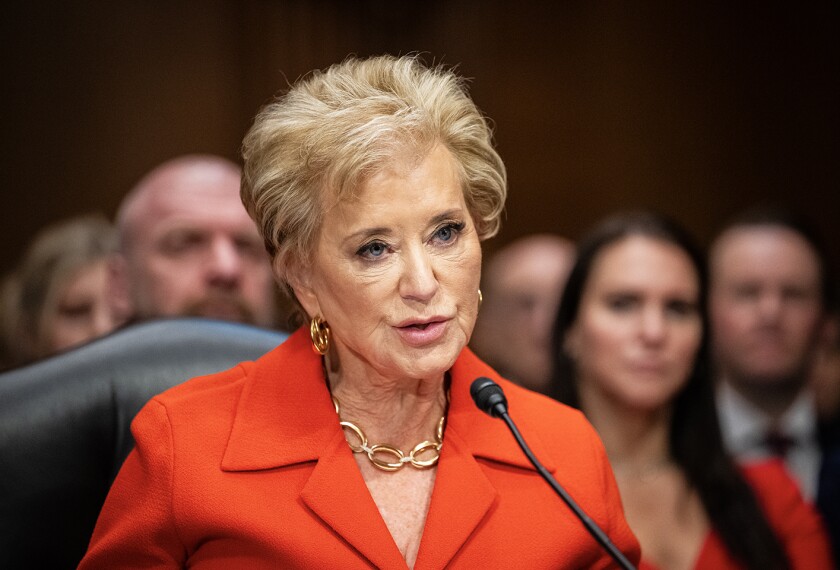School district leaders and advocates for English-language learners are decrying the recent overhaul of Florida’s school grading system that is at the heart of the state’s relief from portions of the federal No Child Left Behind Act. They argue that schools serving large numbers of English-language learners will be unfairly labeled with an F.
Following recommendations from state Commissioner of Education Gerard Robinson, the Florida board of education this month approved changes to the accountability system that will include factoring in English-language learners’ scores on state tests in mathematics and reading after just one year of instruction. Previously, the test scores of ELLs—roughly 250,000 of Florida’s students—were not included in a school’s grade until after two years of instruction.
Mr. Robinson said the change was necessary to ensure that Florida does not lose an NCLB waiver approved by the U.S. Department of Education. But the commissioner’s decision to ignore all but one recommendation from a task force on how best to incorporate the performance of English-learners and of special education students into the grading system has sparked widespread dismay.
Counting Proficiency
One of the task force’s chief priorities—to factor in ELLs’ progress toward becoming proficient in English as a major component of grading schools—was rejected by Mr. Robinson. The panel said using the results of students’ annual language-proficiency exams would hold schools directly accountable for how well they are teaching the language, while also providing a fairer way for ELLs, especially those at the beginning levels, to show progress.
Most new English-learners score at the lowest levels on state reading and math exams because they have not yet acquired enough language to demonstrate what they know in those subjects.
“I think Florida missed an opportunity to be at the forefront on this issue,” said Ester de Jong, a member of the ELL task force and an education professor at the University of Florida in Gainesville who specializes in instruction for English-learners.
“We could have led the way in changing practice,” she said, “but unfortunately, we are setting up a system where schools and teachers are going to be reluctant to have ELLs because of how they will negatively impact their school grades.”
The debate over the inclusion of ELLs and students with disabilities in Florida’s school grading system dates to earlier this year, when Florida became one of 11 states to win relief from core mandates of the No Child Left Behind Act.
But the federal Education Department first demanded that three states—including Florida—substantially change how they would hold schools accountable for students deemed most at risk academically, such as English-learners and students in special education, or risk losing the waiver.
In response, the Florida education department approved amendments to its waiver plan that included grading schools on the performance of ELLs on the state exam known as the Florida Comprehensive Assessment Test, or FCAT, after one year of English-language instruction—a major shift in policy for the state and one that many educators and advocates called a disaster.
In response to the controversy, Commissioner Robinson convened a task force to examine how English-learners who had been in the United States for less than two years and students with disabilities could more fairly be included in the grading system without penalizing schools that serve high percentages of such students.
The panel—which included Alberto Carvalho, the superintendent of the 347,000-student Miami-Dade County public schools—recommended several changes, including using results from ELLs’ annual English-language-proficiency exams, in addition to FCAT scores, to calculate school grades. Doing so, the panel reasoned, would hold schools more accountable for students’ progress in English proficiency, and, by putting pressure on schools to increase proficiency, would, in turn, lead to improved FCAT scores.
That recommendation was acceptable to federal education officials and had even been suggested by the expert panel that reviewed Florida’s waiver application. But the state education department determined that it would require a change in state law, so Mr. Robinson declined to support it.
Using results of language-proficiency assessments as a measure of ELLs’ progress is also among the major recommendations from English-learner experts who were commissioned by the federal Education Department this year to help states hold schools more accountable for such students.
The task force also pushed to weight the performance of English-learners on the FCAT, based on their proficiency levels.

“A level-one score [the lowest level] on the FCAT for a native English-speaker means something entirely different than a level-one score for a student who is a beginner in learning English,” Ms. de Jong said. “So doesn’t it make sense that we would look at those differently?”
But, according to documents from the state department of education, Mr. Robinson said that federal education officials saw that amendment as treating one group of students differently from others and he would not approve its inclusion in the waiver plan.
Mr. Robinson was not available for an interview, but during the May 10 meeting of the state school board, he emphasized that many of the task force’s recommendations would not meet the demands of federal education officials overseeing the conditions of Florida’s waiver.
And although the commissioner did not present most of the recommendations, “it doesn’t mean that we won’t ever do so,” said Cheryl Etters, a spokeswoman for Mr. Robinson.
The one task force recommendation for English-learners that the commissioner did support in his proposal—and that the state board approved—makes an ell’s entry into a school, rather than the country, the beginning point for including him or her in the accountability system.





